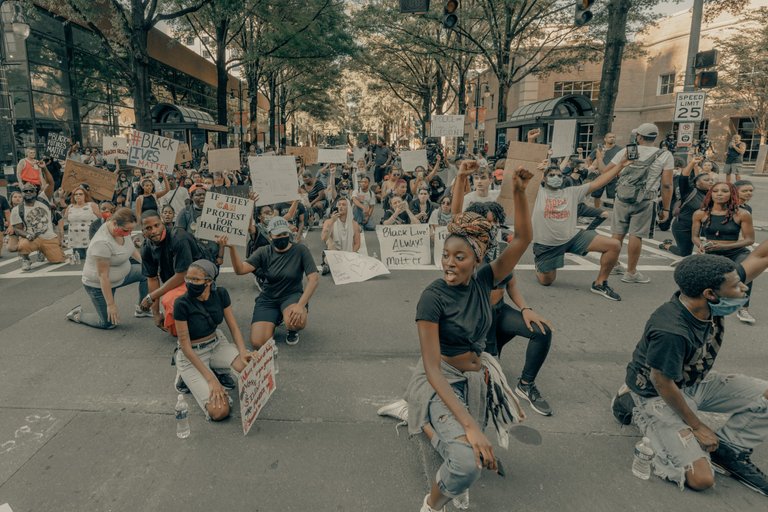
I’m not an expert on racism, racial justice, and race relations. My experience and research have been in the field of abuse: physical, psychological/emotional/mental, sexual, and spiritual abuse. I wouldn’t call myself an expert on abuse, however.
What I have noticed is that there is a great deal of overlap between abuse and racism. Denial of their prevalence, for one. Shoving clichés at survivors and victims. Long-lasting patterns that can affect generations. Psychological trauma.
And I’m not going to even get into the complications of people of color who also experience abuse. It adds a whole new layer of trauma, that, quite frankly, I’m not qualified to talk about.
But today I’d like to share a quote from a book about abuse. As I have listened to the experiences of black Americans, it seems to me that they are expressing the gist of this quote. As I said, I’m not an expert, and I’m certainly a white guy. So maybe I’m off-base here. But I feel that it may help some of my white friends wrap their heads around the situation that black people currently face.
Psychological abuse is not a one-and-done type of harm. I often relate the process that survivors go through as "collecting pebbles." One pebble represents a single, negative encounter with a psychological abuser.
In the early stages of a relationship, there might be an awareness that something isn't quite right. A survivor will have a few pebbles in their fictional bag. The bag isn't very heavy and only holds a couple of weird or hurtful moments with the abuser. Certainly not enough evidence of toxicity to cut a family member from your life, quit a job, break up with a boyfriend/girlfriend, leave a church, and most definitely not enough to end a marriage. They are only a few negative moments, right? At this point, survivors will rationalize that nobody is perfect, and everyone has character defects. Good days and bad days. It is human nature to look at one, two, three, or four unpleasant moments with people and not take them too seriously. We often shrug off these moments and move on. Over time, recognizing the pebbles (hurtful moments) causes the bag to become very heavy—too heavy to carry anymore. Many survivors describe being crushed under the weight of the abuse and the chronic dysfunction of the abuser.
Healing from Hidden Abuse by Shannon Thomas, pp 42-43
However, toxic people like to isolate one incident at a time. They argue that what they said, or did, was not that big of a deal. They want to deal with one pebble at a time and not look at the entire weight of the abuse. They accuse survivors of "focusing on the past" or they say things like, "The problem is that you won't forgive me for my mistakes." No, the problem is that psychological abusers keep making the same "mistakes" or choices to harm other people. They may want to focus on one incident at a time but it's impossible; just like one cannot separate out a single raindrop while in a thunderstorm.
Pebbles of racism
There are probably some of you who had an “a-ha” moment while reading that quote. I certainly did the first time. But let’s correlate this to racism.
Racism, as currently experienced here in America, is generally not the overt racism that we saw 60+ years ago. The schools have been integrated, the libraries serve both blacks and whites, and it’s illegal to discriminate against anyone on the basis of race. We even had a black president for the first time. Most people believe that we should treat everyone equally.
What this means is that racial discrimination tends to fly under the radar. White people tend not to see it, and they certainly don’t experience it.
But if I’m hearing my black brothers and sisters correctly, their experiences are much like the bag of pebbles. A comment here. A slur there. A lack of opportunity or being passed over for a promotion. Unwarranted police actions toward them. Including, sometimes, police officers killing black people.
If they bring up their experiences, some people will downplay the individual action. “Well, maybe they didn’t mean it that way.” “How can you prove that they gave the promotion to someone else because of your race?” “If the black guy had stayed in his car, the police wouldn’t have shot him.” Currently, I’m seeing this type of dismissiveness in the George Floyd case by people pointing out that he had taken drugs or had a criminal background.
If we stop focusing on individual cases, though, and step back and listen to the broader story, things become much clearer. Racism didn’t vanish with the passage of the Civil Rights Act. It just went underground. We have lots of people who profess to believe in equal protection and equal rights while passing laws that discriminate against black people; making insensitive comments about black people; or refusing to hear what they have to say.
So please, stop picking on individual experiences. Listen to what black people are saying. Because it’s time to destroy racism in America.
And especially in the church.
And finally: thanks for listening to a white guy. Now get out and listen to some black people. Even if it makes you feel very uncomfortable.
Posted from my blog with SteemPress : https://joelhorst.com/2020/06/06/why-racism-is-like-a-bag-of-pebbles/